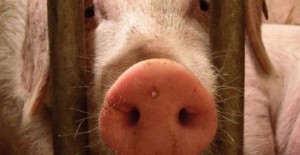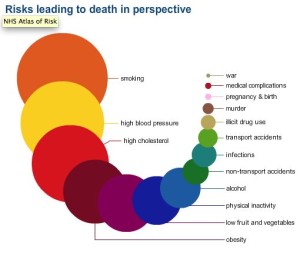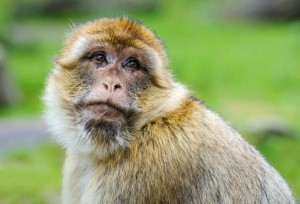وورلدلوگ الأسبوع 9 – 2015
يجب ان يظهر اصل اللحوم المستخدمة في المنتجات مثل اللازانيا، السجق والبيتزا واضح على الملصق. حزبنا قدم عريضة في هذا الشأن للبرلمان الاوروبي، وقد تمت التصويت عليها من طرف الاغلبية! على الملصق يجب ادراج مكان الولادة، الحضانة ومكان ذبح الحيوان المستخدم في هذه المنتجات. هذا الملصق سيعطي المستهلك الوضوحية، وتجعل النقل الطويل للحيوانات واضح. الخنزير المولود في هولندا والمذبوح في ايطاليا، سيتضح على الفور انه عانى مشوار طويل قبل ان يصل الى المسلخ. آكلي اللحوم سيكون لهم الاختيار لقول ‘لا’ ضد نقل الحيوانات الطويل السخيف، ويصبح اختيار المنتجات المحلية سهل. بالإضافة ستساعد هذه الملصقة الموضحة لأصل الحيوان على اكتشاف تزوير اللحوم بطريقة سهلة.
الاسبوع الماضي انتشر على تويتر مخطط معلومات بياني (http://www.nhs.uk/Tools/Pages/NHSAtlasofrisk.aspx) حيث بين من منظور مخاطر صحتك. تصدر التدخين المرتبة الاولى في اللائحة بسبب الوفيات. المثير للانتباه ان مختلف المخاطر الصحية مثل ارتفاع ضغط الدم، ارتفاع الكوليسترول ، السمنة واكل كميات غير كافية من الخضر والفواكه كانت في مرتبة سابقة بالمقارنة بحوادث السير، الحروب وتعاطي المخدرات. انا جد قلقة خاصة بعد الاتفاقية الجديدة للتجارة الحرة TTIP المرتقبة. الهدف من هذه الاتفاقية للتجارة الحرة هو تسهيل التبادل التجاري بين امريكا واوروبا. هذا يهدد بارتفاع استيراد المنتجات الغذائية الغير الصحية. معهد سياسة الزراعة والتجارة Institute for Argiculture and Trade Policy يعطي هنا (http://www.iatp.org/documents/10-reasons-ttip-is-bad-for-good-food-and-farming) 10 اسباب لماذا TTIP سيئة لغذائنا.
الاتجار الغير مشروع في القرود البربرية يجب معالجته! كل سنة يتم صيد ما يقارب 200 قرد بربري من بر المغرب، لبتم بيعه في أوروبا كحيوان اليف. في حين هذه الحيوانات مهددة بالانقراض وغير مناسبة تماما لتكون حيوان اليف. حيث تنتهي في نهاية المطاف في الملاجئ التي قدرتها الاستيعابية لا تتحمل هذا التدفق. إذا لم يتم فعل شيء، فان هذه القرود يتوقع الخبراء انقراضها بعد خمسة عشر او عشرين سنة. دعا حزب من اجل الحيوانات المفوضية الاوربية للتحقيق في كيفية معالجة الاتجار الغير مشروع في القرود البربرية. طلبنا هذا (https://europa.partijvoordedieren.nl/vragen/vragen-over-illegale-handel-in-berberapen) حصل لحسن الحظ على دعم واسع: لقد تمت المصادقة عليه من طرف اعضاء البرلمان من كافة الاحزاب السياسية في البرلمان الاوروبي.
صاحب الدولفيناريوم اسبرو Aspro Parks اتهم بسوء معاملة الحيوانات. في هذا الفيلم المصور بسرية (http://www.telegraaf.nl/binnenland/23691095/__Dolfinarium_eigenaar_verdacht__.html?utm_source=t.co&utm_medium=referral&utm_campaign=twitter) يظهر كيف يوجه مدرب اللوم لدلفين ويعنفه باستمرار جسديا. الدولفيناريا تسلب الحيوانات حريتهم لغرض وحيد هو ان تبين للناس بعض الحركات الفنية. مساحة العيش جد صغيرة بالنسبة لهم بطبيعة الحال، سلوك الهجرة عبر المحيطات. هناك مشاكل مختلفة خطيرة مثل اللامبالاة وسلوك العدوانية، الاجهاد، سلوك القلق الغير عادي للأمهات تجاه المواليد الجدد مقاومة جسدية ضعيفة، كلها نجدها على نطاق واسع بين الحيوانات في الدولفيناريوم. اعتقد ان الدولفيناريوم يجب ان تجهز لأهداف اخرى. عوض تسلية الناس يجب ان تكون من اولوياتها استقبال المؤقت للحيوانات البرية التي تعاني مشاكل مستعجلة.
مثير للاهتمام مخطط المعلومات البياني التالي (http://www.economist.com/blogs/graphicdetail/2015/02/daily-chart-14?fsrc=scn/tw/te/dc/oceansofwaste) على موقع نرى اغلبية البلاستيكات الملوثة للمحيطات من اين تأتي.
الى الاسبوع المقبل!
تحياتي، ماريان
The origin of meat contained in products like lasagnes, hot dogs and pizzas must be clearly labelled. Our party advocated for this in the European Parliament and a majority voted in favour of it. The labels must contain the place of birth, of rearing and of slaughter of the animals contained in the product. Such label of origin will give transparency to customers and make the many, long animal transport visible. The fact that a piglet was born in the Netherlands and slaughtered in Italy immediately indicates that the piglet had to travel through hell to end up in the abattoir. This way, meat eaters are given the choice to say ‘no’ to outrageously long animal transports and it will be easier to choose regional products. Additionally, such label of origin will improve the traceability of meat fraud.
Last week an infographic was published on Twitter, which showed health risks in perspective. Smoking was top of the list of causes of death. It was striking to see that several health risks such as high blood pressure, high cholesterol, obesity and eating too little vegetables and fruit ranked much higher than matters like traffic accidents, war and drugs abuse. I find this very concerning, especially because the Free Trade Agreement TTIP is likely to be concluded. The objective of this free trade agreement is to make trade easier between the United States and Europe. This is likely to lead to an increase in the import of unhealthy, processed foods. The Institute for Agriculture and Trade Policy here lists the ten reasons why TTIP is bad for your food.
The illegal trade of Barbary macaques must be stopped! About 200 Barbary macaques are caught from the wild in Morroco each year to be sold in Europe as a pet, while they are threatened with extinction and they are completely unsuitable to be kept as a pet. They are frequently dumped at animal shelters, which can hardly deal with the flow of these apes. Experts are expecting that this cute looking small ape will be extinct within fifteen to twenty years if nothing is done to stop it. The Party for the Animals calls the European Commission to investigate with European countries how this illegal trade in Barbary macaques can be stopped. Fortunately, our call was widely supported: it was signed by the Members of Parliament of all political groups in the European Parliament.
Dolfinarium owner Aspro Parks is suspected of animal abuse. This undercover film shows how a trainer continues to shout at the dolphin and physically abuses it. Dolfinariums deprive animals of their freedom only for the purpose of showing them to humans and making them perform tricks. Their living environment is much too small for their natural migratory behaviour through the oceans. Serious welfare problems such as apathetic and aggressive behaviour, stress, abnormal maternal behaviour for newborns and lowered resistance are often found among animals in dolphinariums. I think that dolphinariums have to adopt a new objective. Instead of providing entertainment to humans, the temporary shelter of wildlife animals in need should be central.
Interesting fact: this infographic on the website of The Economist shows where most of the plastic polluting the oceans originally comes from.
Until next week!
Greetings, Marianne


